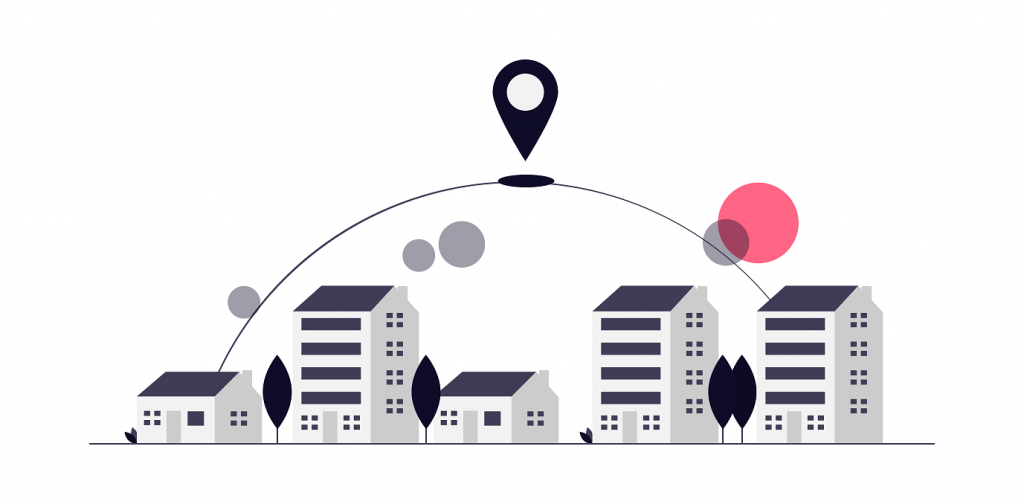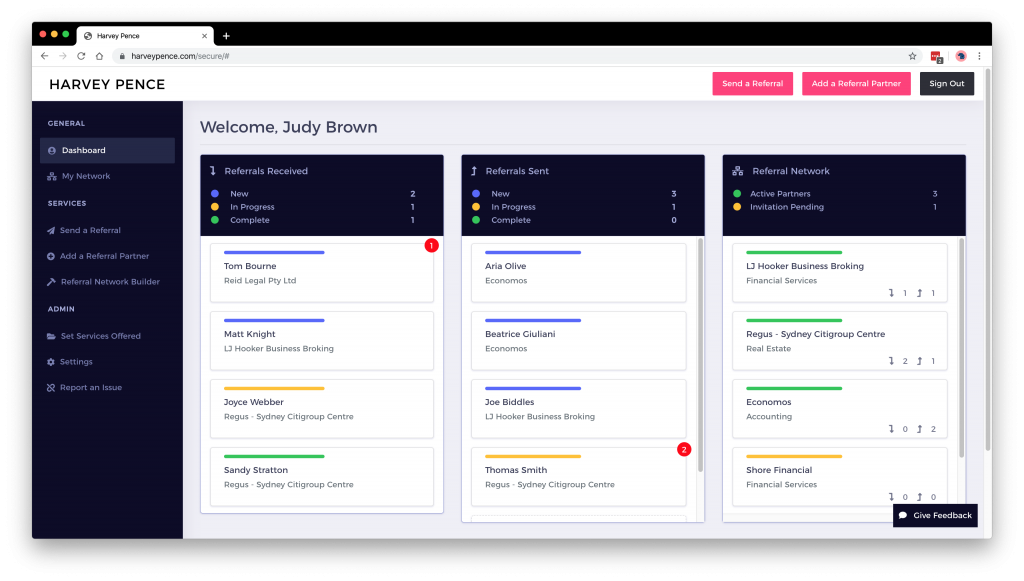
The Comprehensive Guide: Getting Customers with a Referral Network
Referrals? Referral Network? Want more customers? If you’re new to referral networks, been involved in one or keen to improve the one you’re in, you’ve come to the right place.
Businesses typically focus on more costly ways to get customers. Spending a bunch of money each year on marketing via Social Media ads (Facebook, Instagram etc), Print ads, Events, Podcasts, Email Marketing and Search Engine Optimisation to name a few. Often these marketing strategies have a tremendous upfront cost and end up not delivering. You might have even gone into detail about calculating your Customer Acquisition Cost to help justify the marketing mix you’ve ended up with.

Having customers referred to you is often overlooked in a business’s acquisition strategy. Whilst ‘word of mouth’ referrals from customers get all the limelight, referrals from other businesses are typically better quality referrals as the customers’ scenario has been reviewed by an expert. They therefore have all the benefits of word of mouth referrals, without the quality issues that come with being referred any customer.
This is where a referral network comes in. If you’re looking to create a steady stream of highly engaged customers at a fraction of the cost of other marketing channels, your first step should be to establish or join a referral network. Read this Guide to a Referral Network to learn more.
- What is a referral?
- What is a referral network?
- Why a referral network is important?
- Who can use a referral network?
- What scenarios can a referral network help with?
- How do you build a referral network?
- What is the best way to approach potential partners?
- How to identify referral opportunities?
- How should you send referrals?
- Why should you meetup with your referral network?
- What should you talk about in a Referral Network Huddle?
What is a Referral?

A referral is a recommendation of a business, product or service to a customer. There are a range of ways this occurs but most commonly it involves a business meeting with their valuable customer and identifying a customer need that they need another businesses help to solve. The business therefore refers the customer to another related but non-competing business for help.
A great business referral is one that is sent to the best expert that is also close to the customers location. To maximise success, the referral should include the customers name, email, phone number, needs they need help with, who the referral came from and any other particular context that might assist in the referral being successful. As you are often referring the customer to a business they have not dealt with before, it is good to include some comments about the customer to help the receiver of the referral build rapport.
What is a Referral Network?

A referral network is a group of businesses that work together to help their customers. A business’ referral network typically consists of businesses in related fields that don’t directly complete with but instead compliment their offering. When a customer needs help with something that a business doesn’t offer, a business typically refers the customer to another business in their referral network.
Why a referral network is important?
Customers usually require multiple businesses to get what they want done. Having a trusted referral network helps businesses make sure their customers have a great experience when moving between businesses.
Being part of a great referral network has a massive amount of benefit for businesses too. Most businesses rely on a referral network to gain new customers and having a referral network can more than double the referrals your business receives. Astonishingly, very few businesses actually have a formal referral network, the key ingredient to receiving a steady stream of great quality referrals and new customers.

Sending and receiving great quality referrals has numerous other benefits for a business, these include:
More customer loyalty
- Your customers are happier when all of their needs are taken care of and businesses in your network have other skills to help your customers more.
More customers
- Businesses in your referral network will rely on your business to help their customers, sending you customers when their products or services can’t provide what the customer needs.
- By joining a referral network, you instantly add to your network and typically gain the networks of those in your referral network.
More time
- You can find ways to help each other by working together, such as promoting each others business to your respective networks.
- You may even decide that one member of the network takes care of an initiative, increasing the collaboration so your business doesn’t have to do everything.
More fun
- The group works together collaboratively, to achieve more together, using each member as a business advisor of sorts and vice versa.
- You’ll learn from the unique skills, experience, and connections each business has.
Who needs a referral network?
A business who’s customers have needs and wants that can only be serviced by another business need a Referral Network. A Referral Network is relevant to nearly all business that help customers in a similar scenario to other businesses, without actually offering the same product or service. For example, when selling their house, a customer needs to work with a real estate agent, a solicitor and potentially even an accountant.
What scenarios can a referral network help with?
Whilst there are an infinite amount of scenarios and different mixes of businesses that can help in each, below are some examples of particular customer scenarios and the businesses that can help in each:

Personal Events:
- Planning a wedding: wedding planner, venue, DJ, caterer, celebrant, wedding dress shop, suit hire, photographer, videographer and celebrant.
- Losing weight: nutritionist, personal trainer, meal delivery service and counsellor.
Personal Transaction:
- Purchasing a house: real estate agent, mortgage broker, solicitor and accountant
- Moving house: cleaner, removalist and locksmith
- Renovating a home: builder, plumber, electrician and glazier.
Business Transaction:
- Starting a Restaurant: designer, real estate agent, insurance broker and finance broker.
- Starting a company: accountant, solicitor and insurance broker.
- Selling a business: business broker, solicitor, accountant and tax specialist.
How do you build a referral network?
If your business has a variety of products and/ or services that help customers in different scenarios, you may need a referral network for each scenario. Regardless of if you help with one or many scenarios, below are the tools to get you started.

To build your core referral networks, start by drawing a circle for each customer scenario and label each circle after the scenario. One might be ‘buy a home’, the other might be ‘help customers with the move’. In each circle, list the following:
- What other business types help my customer in this scenario?
- What are some businesses I already know who match this business type?
- What is the strength of my relationship with these businesses?
If you don’t have matching businesses, no worries, in the next section we’ll help you find the best businesses to have in your referral network. You now have different groups of businesses that would be ideal referral partners.

When looking for specific new connections to be one of these referral partners, find ways to connect with these specific business types by:
- Searching the business types you need through google and finding businesses near you or your customers that have ratings above 4.5 stars.
- Attending specific events catered to your industry including trade shows and industry conferences.
- Joining a networking body like a Chamber of Commerce.
Based on using this strategy, a Real Estate agent would have three networks with these business types:
- Sale & Purchase Network; mortgage broker, accountant, insurance broker and solicitor.
- Property Maintenance Network; electrician, plumber and locksmith
- Moving in Network; cleaner, mover and a locksmith
If this seems a little complex and you want us to help, we offer a free tool to help you build a referral network, simply login and start your free trial at harveypence.com to use.
What’s the best way to approach potential referral network partners?
When you’ve identified a business, you need to offer value. There’s no way around it. Unless you’re valuable for them, they have no reason to be in your network. We suggest therefore, you start with giving and by that, we mean uncovering additional needs your customer needs help with and sending these as referrals to your partners.

Start by sharing contact info, asking them what services they offer and build a genuine relationship. Don’t make the common mistake of trying to get down to business and extract value from the relationship too quickly. You’ll get the most benefit quickly if you ask to go see and experience their product or service.
Once likability of their product or service is covered off, there are four foundational elements to cover off:
- Help these businesses understand what you do and how you can help their customers.
- Get to know these businesses and how they can help your customers.
- Start giving them referrals from your customers.
- Ask them to look out for referrals for your business
How to identify referral opportunities?

During the conversation with your customer, you’ll understand the context of their scenario. As your business is an expert in your industry and particular scenarios, you’ll understand if the customer is well prepared or not. To help you uncover the customers scenario, you may want to ask relevant questions such as the below:
- Have you been involved in a [insert scenario] like this before?
- What worked well and not so well last time?
- Have you been in contact with any other businesses to help?
- How are you feeling about this scenario?
- Is there anything you need help with?
- Is there anything you are unsure about?
This will give you a comprehensive grasp of where your customer is at and where you and your referral network can add value.
How should you send referrals?
You want your customers to get help as quickly as possible, and you want the referral sent without you needing to follow up. The problem is that, referrals typically don’t contain all the information required to get the customer help, don’t update you as the status updates progress and platforms like LinkedIn aren’t built for two-way referrals, therefore it’s hard to know how many you’ve sent or received from a given partner.

As a business owner, you need things to be easy and don’t want to waste time on follow ups. To get around these issues you should utilise a platform to:
- Build your referral network
- Refer customers between business
- Review the performance of your network
With this in mind, we built harveypence.com to make referrals between businesses easy.
Why should you meetup with your referral network?
Businesses strengthen their referral network by regularly catching up with other members. These regular Referral Network Huddles will increase the value to each member of their referral network by increasing the volume of customer referrals between members.

As discussed in our article on creating your first referral network, members of a referral network need to:
- understand where your partner’s expertise is and how they can help your customers
- understand your expertise and how you can help their customers
- like you, trust and advocate your product or service
- help each other and they need to reciprocate with you
To stay in sync with your referral network, we recommend catching up:
- over the phone or online at least every fortnight.
- in person at least every two months.
There are plenty of free services available online (like Skype, Google Hangouts) that allow you to create a phone or video conference – perfect for your fortnightly catch ups.
For your in person catch ups, you should avoid places like coffee shops or restaurants for your catch ups and aim for somewhere quiet like an office or someone’s house. We’ve seen some great examples of referral networks putting together a roster of hosting duties with each member hosting their bi-monthly catch up and then passing the duties onto the next.
Catching up regularly helps members improve key components of the referral network and the in-person catch ups have the added bonus of getting to know each other on a social basis.
What should you talk about in a Referral Network Huddle?

To maximise value, you should make sure that your catch ups cover the following at a minimum:
- How
are we uncovering the customer needs we can help with and:
- What worked well?
- What could be improved?
- How
is the referral process working for us and:
- What worked well?
- What could be improved?
- How
well are we converting referrals and:
- What worked well?
- What could be improved?
Discussing these will increase the value of your network, allowing you to help more customers and receive referrals in return.
As we continue to help more businesses and understand their challenges and where more help is needed, we’ll update this guide to continue to improve. If there are any more sections that you would benefit from, then leave it in the comments and we’ll update and include new content thats relevant to you.
Take the pain out of referring customers with harveypence.com.